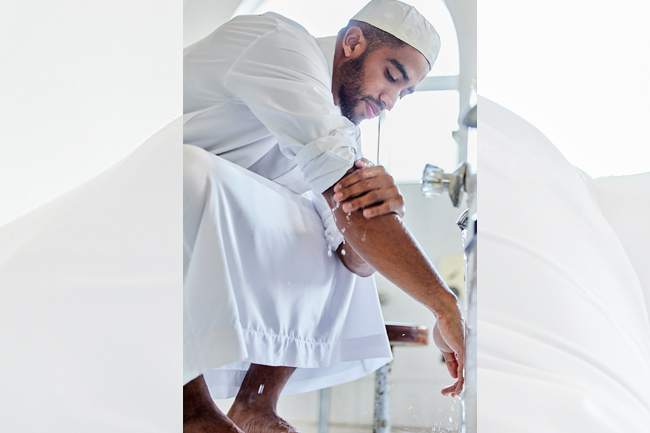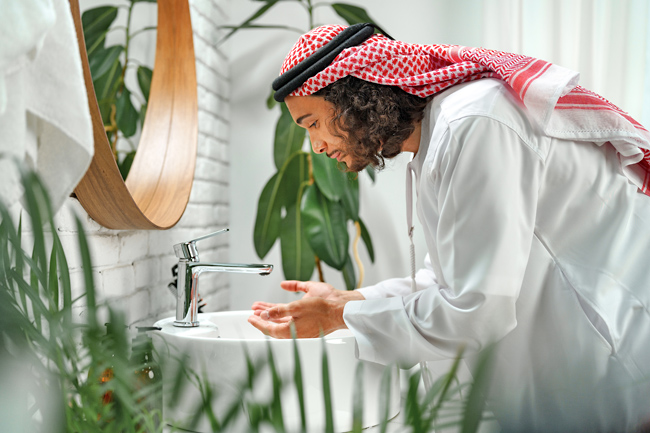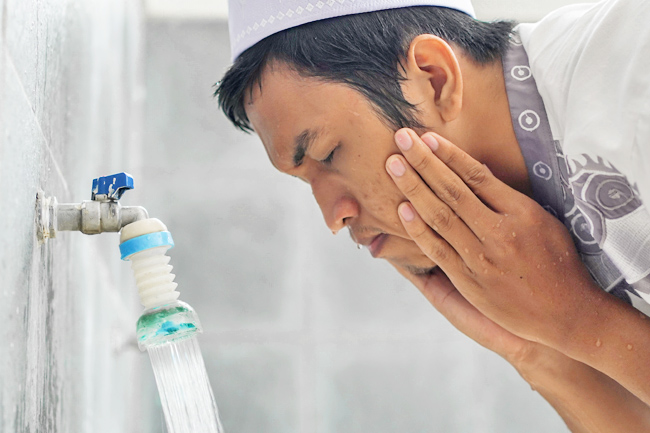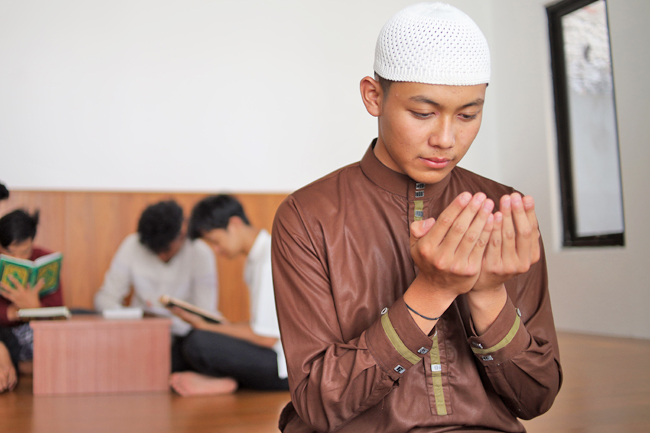ANN/THE DAILY STAR – There’s something profoundly calming about washing your face with cold water on a sweltering afternoon. That first splash – the one that shocks your skin and jolts your senses awake – feels almost medicinal.
Now, imagine doing that repeated times a day, paired with a full-body refresh that leaves you cleaner, lighter, and, strangely enough, healthier.
That’s wudhu – the ritual ablution Muslims perform before prayer and while most know it as a prerequisite for prayer, few realise that it’s also one of the simplest, most overlooked health practices that has stood the test of time.
THE SCIENCE OF CLEANLINESS
Think about it.
Every time you perform wudhu, you are essentially hitting reset on your body. Washing the hands multiple times a day? That’s Infection Control 101. Science backs it too – studies show that washing hands frequently can cut respiratory infections by 16–21 per cent. It’s a habit drilled into us since childhood, but wudhu makes it effortless. When Prophet Muhammad (pbuh) taught that cleanliness is half of faith, he was not just talking about piety; he was giving the ultimate life hack for disease prevention.
WASHING AWAY POLLUTION AND GERMS
Then there’s the face. Washing your face multiple times a day is an under appreciated luxury, where dust and dirt accumulate on your skin like an unwelcome second layer.
Dermatologists will tell you that cleansing regularly reduces acne and prevents clogged pores. But wudhu takes it further, reaching the nose, which – fun fact – is a natural filter for dust and bacteria.
Scientists have found that rinsing the nasal cavity lowers the risk of respiratory infections, which makes you wonder if the generations before us knew something we have only now started to understand.
ORAL HYGIENE AND FRESHNESS
Moving further down, wudhu includes washing the mouth – something even the busiest among us forget to do after every meal. If you are someone who relies on strong mints to get through post-lunch meetings, consider this: studies suggest that rinsing your mouth many times a day can drastically reduce oral bacteria, keeping cavities and gum disease at bay. It’s a full-circle moment when you realise that even the miswak, a natural toothbrush used by Prophet Muhammad (pbuh), has been proven to be more effective in fighting plaque than regular toothpaste.
STRESS RELIEF THROUGH RITUAL CLEANSING
Then comes the most overlooked yet fascinating part – the light massage of the head and ears. Running damp hands over the scalp and massaging the temples? That’s textbook stress relief.
Neuroscientists say that such small, repetitive actions can activate the parasympathetic nervous system, bringing a sense of calm. Ever notice how a good head massage can melt away tension? Wudhu does the same thing – subtly, consistently, every few hours.
FOOT CARE AND CIRCULATION BOOST
Last but not least, the feet are the body component that is most mistreated and neglected.
Walking means accumulating layers of dust and perspiration among others.
Regular foot washing increases circulation in addition to removing dirt, especially when done with cold water. Some even argue that it’s a natural form of hydrotherapy, refreshing tired legs and keeping fungal infections at bay.
MORE THAN JUST CLEANLINESS
But wudhu is not just about hygiene. It’s a reset button, an opportunity to pause. In the midst of daily life, it pushes you to pause and participate in a ritual that is highly personal yet universally helpful.
According to Prophet Muhammad (pbuh), wudhu removes small sins in the same manner that water removes filth. Perhaps, beyond sin, it also washes away stress, lethargy, and the mental fog that accumulates through the day. That moment of cleansing – of standing before a sink, water running, hands moving with purpose – might just be the simplest form of self-care we never truly appreciated.
MAKING WUDHU A DAILY HABIT
And here’s the thing: maintaining wudhu throughout the day does not have to be a chore. It’s not about rigidly redoing it every time you think it might be broken. It’s about making it a habit, a natural part of your rhythm.
You don’t wait until you stink to take a shower, so why wait until prayer time to freshen up? A quick wudhu before heading out, before meetings, before sleep – it’s effortless once you let it weave into your routine.
Somewhere along the way, in the rush of modernity, we have compartmentalised wudhu – treating it as a box to tick before prayer rather than the powerful, centuries-old practice it was meant to be.
But it’s still here, waiting, offering a quiet kind of healing. It doesn’t demand much – just a few splashes of water, a few moments of mindfulness. And in return? A cleaner body, a clearer mind, and a connection to something much bigger than ourselves.









